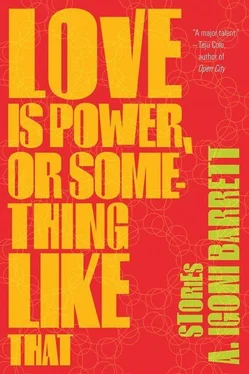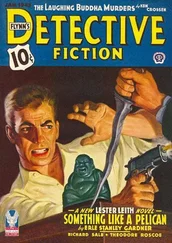“God forbid!” Mr. Farasin directed a reassuring look at her. “As long as this matter is in my hands, you will never taste defeat, don’t worry.”
They spent more time on the exorcism than ever before. (It will get worse before it gets better, Mr. Farasin told her, and then reassured her that in his visions she was always beside her husband, in this life and the other, so no fear of that. ) Mr. Farasin sprinkled holy water in every corner of the house and boys’ quarters, even the late cook’s room, then went into the garden and sprayed the grass, the trees, the algae-covered fishpond. By the time he emptied the bucket Perpetua was tight-lipped, her eyes darting at every sound, and it was close to the hour Daoju came back home. Perpetua didn’t hurry him, but she was anxious that he depart before her daughter returned. The fight with her husband was still fresh in her mind.
While Mr. Farasin stood in the sitting room, wiping his hands on his trousers, Perpetua ran up the stairs, burst into her room and grabbed some money, then dashed downstairs. Mr. Farasin was no longer where she left him. She was about to call his name when she noticed that his bag, too, was gone. That’s odd, she thought, as she stared at the closed front door. Then she strode forward, picked up the glasses they had drunk from, and headed to the kitchen.
As she entered the kitchen doorway, Perpetua caught a movement, turned her head to look, and froze. Huddled in the far corner, his open attaché case clutched in one hand and in the other two sweet potatoes, was Mr. Farasin. At her gasp, he whipped his head around, and a spasm tightened his face, he seemed about to rush forward, as if to escape or to attack her. Perpetua dropped the glasses with a crash to the floor, and staggered backward.
“Mr. Farasin! What is this, what are you doing?”
He stared down at the sweet potatoes in his hand. “I’m. . ehm. . I was. . ah. .” His voice trailed off.
The truth was revealed. All this time, it had been him. “So it was you!” Perpetua shouted, stabbing her finger at him. “It was you stealing my food! But how could you, Mr. Farasin?”
Mr. Farasin dropped to his knees, his lower lip trembling. The sweet potatoes fell from his hand and bounced across the floor. His bag toppled on its side and from its open mouth rolled out onions, tomatoes, two eggs, a scattering of Maggi cubes.
“I’m sorry, ma,” he begged, wringing his hands and then wiping his face with them. “Please forgive me, I didn’t know what I was doing, it is the devil’s work.”
Perpetua’s face crumpled. All lies, lies, nothing but lies! She had been deceived. She had opened her house to a snake, a thief, exposed her family. Her husband was right again: she knew what he would say when he heard of this. Money-grabbers and charlatans, the words that had started their fight a week ago, were nothing compared to the ones he would use. Thieves. Home breakers. The people you thought would save my daughter’s life when you ran away and left her dying in my arms.
“Mr. Farasin, you have killed me,” Perpetua said, her voice breathless with pain. Mr. Farasin — who was begging forgiveness with quoted Bible verses — looked up at her tone, and then crept forward on his knees. His voice rose, desperate, edged with hope. Perpetua shook her head from side to side and clamped her hands over her ears. Then she strode forward, her house slippers crunching on broken glass, and screamed at Mr. Farasin: “Get out, just get out—” and as he scrambled to his feet, grabbed up his bag and made to empty the stolen items, she flailed her arms at him, “—no, take it, take everything, just get out of my house before my daughter sees you!”

Perpetua sat in the sitting room, feet drawn together and knees apart, her hands lying on her Bible in her lap, and cried with heaving sobs. Tene bustled about her and pled for an answer. In response to her questions, Perpetua cried harder.
When Daoju returned from school to find her mother weeping, she pushed the Bible aside and climbed into her lap. She wrapped her arms around her mother’s neck and pressed her lips to her wet cheek. Her daughter’s clean, untainted smell, her cuddliness, made Perpetua shudder. Hugging each other tightly, they cried together. Tene stood behind them, beaming through her tears.
Godspeed arrived at evening to find the house as quiet as an empty cathedral. He asked Tene for his daughter’s whereabouts, but the housemaid shrugged her shoulders and averted her eyes. In response to his next question, she said, “In your bedroom,” then flashed him a look so charged with meaning that he turned away, confused.
He mounted the stairs slowly, crossed the upstairs hallway with a careful tread, and nudged open his bedroom door. The room was in darkness. As he pressed the door closed he heard the bed sheets rustle. “Don’t put on the light, please,” Perpetua whispered.
He could feel her stare as he walked toward the bed. “Are you ill?”
“No,” she replied. “Won’t you lie down?”
“But I’m a demon, isn’t that what you—”
“Please, Godspeed, don’t.”
With a shock, Godspeed realized she was crying. He bent down quickly to set his briefcase by the armoire, and then sat on the bed and removed his shoes, his socks, his tie, his shirt and trousers. He lifted the covers and slipped in beside her in his vest and briefs. As he turned to face her she wrapped her arms and legs around him. She was naked, her skin burned. He could feel himself melting, sinking under the spell. She was different, something had changed.
“I have something to tell you,” she said.
He waited, afraid to ask, to move, to spoil the moment.
“I love you,” she said.
Except for the grandfather clock, which ticked in the hallway, the house was silent.

The next day, the second-to-last Saturday in May 1970, the Anabrabas, father, mother, and child, dressed up and paid a visit to Banigo Bright Studios, where their happiness was caught, forever, on photographic film.
Perpetua got a phone call later that day. Judith, her best friend with whom she had lost touch at the start of the civil war, was dead. She was shot by the wife of her navy captain lover, after the woman caught them in her home. The bullet entered the back of her head and took her face along when it exited.
Perpetua flung away the receiver with a shrill scream. Tene came running, and Godspeed stood on the staircase landing and listened. Then he approached his weeping, shivering wife, put his arms around her, and said, “At least it was quick. No pain, no suffering. That’s the way to go.”

Daoju was five years old when Tenemenam married. Her fiancé was moving to Port Harcourt to seek his fortune and Tene was sure that if she let him go alone she would never see him again. The wedding reception, planned by Perpetua and paid for by Godspeed, was held on the grounds of the Anabraba house, their parting gift and wedding present. After the good-byes, the hugs, and the promises to stay in touch, Tene climbed into the van that waited to bear her and her hoard of scavenged possessions away, and as the engine revved, as she thrust both hands out of the window and waved, Godspeed stepped forward and dropped a manila envelope thick with money into her lap. The car shot forward, trailing Tene’s squeal.
That was the last they heard of her.
.3 .
New Year’s Eve 1983, the military struck again. It was the fifth putsch the country had seen in twenty-three years of independence, and the third successful one. But this regime, it soon turned out, was unlike anything that had come before. Its leaders, like all soldiers, believed in the right of might. They had a deep aversion for corruption, for indiscipline, for all forms of opposition. They held civilians in low regard. They had a fondness for Herculean tasks and idiom, such as “cleaning out the Augean stables of our great nation” and “destroying the hydra-headed monster of corruption.” They had messianic ambitions.
Читать дальше


![Сьюзан Кейн - Quiet [The Power of Introverts in a World That Can't Stop Talking]](/books/33084/syuzan-kejn-quiet-the-power-of-introverts-in-a-wo-thumb.webp)










